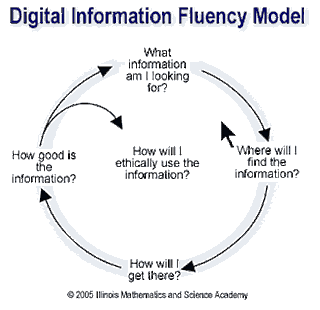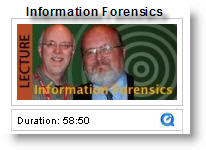|
Purpose & ObjectivesFor most students, online research just doesn’t come naturally. Locating relevant information is not easy. Determining if the information is credible is even harder and requires investigative skills to evaluate sources. The purpose of this session is to provide participants with an understanding of efficient methods for evaluating online information and to demonstrate effective ways to teach these information fluency skills in classrooms. The new generation of NETS standards for students (ISTE, 2007), is based on the premise that efficacy and productivity depends on students’ abilities to conduct research and manage digital information fluently. An essential skill is the ability to evaluate information from a variety of sources and media. This session directly addresses this information fluency standard by helping participants… 1. Understand the role of investigation (information forensics) in evaluating information:
• Two types of searching: how investigation differs from speculation;
• Determining when investigative searching is necessary and when it is not;
• Effective means of finding critical information with limited clues;
• Using specialized search engines and browsing techniques to track down information;
• Analyzing results to determine credibility of the source and content. 2. Observe effective methods for helping students exercise speculative search skills:
• Off-line 'readiness' activities;
• Group and individual Search Challenges;
• Interactive tutorial games;
• Think-aloud searches;
• Evaluation reporting;
• Group discussion about credibility. Outline Introduction to Information Fluency and NETS for Students (5 minutes) The big picture: Obstacles to Information Fluency--research discoveries: (5 minutes)
• Problems with speculation: using the right words with the right databases
• Homing in on increasingly relevant information
• Problems with investigation: evaluating credibility Determining when to use investigative searching: (5 minutes) Effective investigative strategies and techniques—teaching demonstrations involving audience participation (35 minutes)
• 'Readiness' off-line teaching and learning activities
• Selected Information Forensics tutorials (finding the author, publisher, date)
• Selected Search Challenges (think-aloud)
• Determining a basis for credibility (group discussion) Questions (5 minutes) Supporting Research Burton, V. T., & Chadwick, S. A. (2000). Investigating the practices of student researchers: Patterns of use and criteria for use of Internet and library sources. Computers and Composition, 17 (3), 309-328. Heine, C. (2006). Evaluating digital information. Illinois Mathematics and Science Academy. Retrieved Sept. 23, 2008, from http://21cif.imsa.edu/rkitp/ features/v1n4/leadarticle_v1_n4.html ISTE. (2007). National Educational Technology Standards for Students: The Next Generation. ISTE. Retrieved Sept. 23, 2008, from http://www.iste.org/Content/ NavigationMenu/NETS/NETS_Refresh_Forum/NETS_for_Students_2007.pdf Press release. (2006, March 24) School library media programs critical to high school reform. American Library Association. Retrieved April 11, 2006, from http://www.ala.org/Template.cfm?Section=News&template=/ContentManagement/ContentDisplay.cfm&ContentID=121131 Presenter Background Main presenter: Carl Heine, Ph.D. is Director of the 21st Century Information Fluency Project at the Illinois Mathematics and Science Academy, Aurora Illinois. He oversees research and the development of interactive learning games and interactive media used in the Project. He conducts numerous Information Fluency workshops each year in Illinois and other states, including the Illinois Principals Association, the Illinois Association for Supervision and Curriculum Development, the Illinois State Library Media Association, the Illinois Educational Technology Conference, the Missouri Association of School Librarians, the Wisconsin Educational Media Association and the Alabama Educational Technology Association. Carl earned his doctorate in curriculum and instruction at the University of Chicago for research in flow and mathematical achievement. Previous leadership assignments include managing the Center for Youth Education at the College of DuPage (Glen Ellyn, IL) and directing educational programs at churches in Washington and California. Co-Presenter: Dennis O'Connor was an elementary and middle school teacher for 25 years. At the turn of the century he left the face to face classroom to become an online teacher, course designer and educational technology consultant. He earned an MS. in Online Teaching and Learning from California State University, East Bay (formerly CSU Hayward) where he also taught graduate students how to teach online. Mr. O'Connor recently earned an M.Ed in Instructional Design and Technology Integration at Western Governors University. He earned his undergraduate degree in English at the University of California, Berkeley. In 1995, groundbreaking work in technology infused interdisciplinary teaching led to a Milken National Educator Award. After working online with the ISTE, National Educational Technology Standards Project in 1998, Mr. O'Connor became a project writer developing units of practice for ISTE-NETS, Connecting Curriculum and Technology. Dennis remains active as a subject matter expert, standards review consultant and project writer for ISTE. Dennis previously worked as a Senior eLearning Architect for the 21st Century Information Fluency Program, which is sponsored by the Illinois Mathematics and Science Academy. He also teaches online professional development classes for the 21st Century Information Project and for the University of Wisconsin-Stout, where he is the program advisor for the E-learning and Online Teaching Graduate Certificate Program. Last year, Carl and Dennis presented a similar lecture at NECC in San Antonio and the year before were recognized as a Best of the Best for their Power Searching workshop at NECC in Atlanta. | 



























